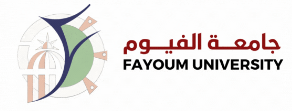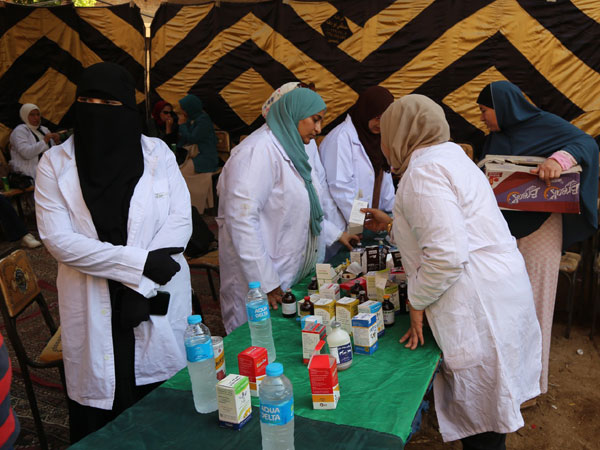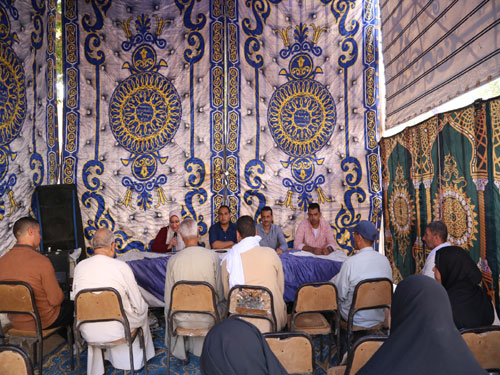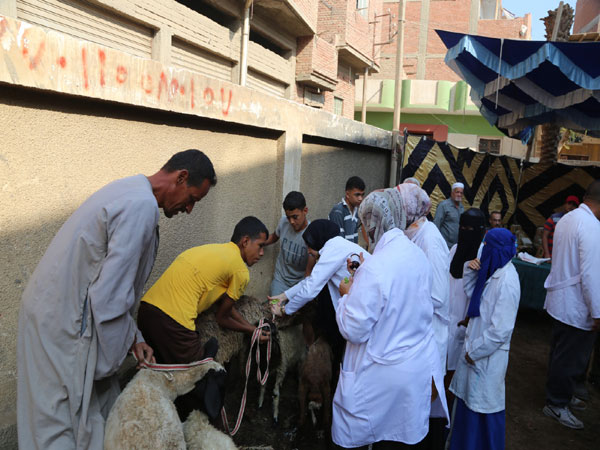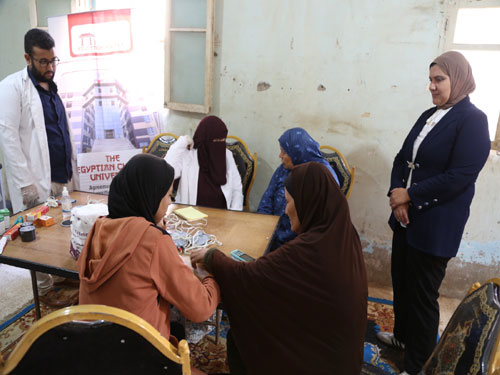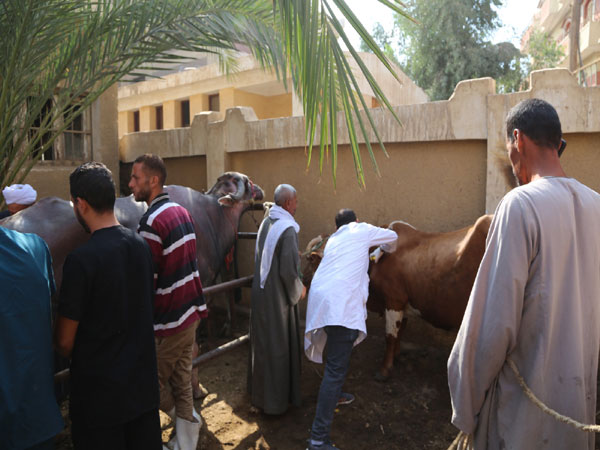Under
the patronage of Dr. Ahmed El-Ansary, Governor of Fayoum, Prof. Yasser Magdy
Hatata, President of Fayoum University, Prof. Rasha El-Khouly, President of the
Egyptian-Chinese University, and the supervision of Prof. Assem El-Essawy, Vice
President for Community Service and Environmental Development Affairs, the Community
Service and Environmental Development Sector at Fayoum University, in
cooperation with the Egyptian-Chinese University, the Faculty of Agriculture at
Fayoum University, the Veterinary Medicine Directorate, and the Fayoum
Veterinary Syndicate, organized a comprehensive development convoy in the
village of Al-Ajameen, Abshaway Center, Fayoum Governorate, on Monday, October
27, 2025.
The
convoy was attended by Professor Dr. Iman Ahmed Abu El-Fadl, Professor and Vice
Dean of the Faculty of Veterinary Medicine and Coordinator of Development
Convoys at the Egyptian-Chinese University; Prof. Bothaina Youssef Fouad, Dean
of the Faculty of Agriculture at Fayoum University; a team from the Faculties
of Physical Therapy and Pharmacy at the Egyptian-Chinese University; Mr. Abdel
Nasser Bakry Mohamed, Director General of the General Administration of
Community Service and Environmental Development; and Dr. Sherine Mohamed
Mahmoud, Head of Abshaway Center and City. Dr. Shaimaa Mohamed Ramadan,
Director of the Seminars and Conferences Department; Dr. Ahmed Ramadan Abdel
Tawab, Lecturer in Soil and Water department; Prof. Safaa Ragay Abdel Naby,
Professor of Rural Sociology at the Faculty of Agriculture; and Dr. Hamdy Abdel
Naby Zaky, Professor of Horticulture at the Faculty of Agriculture.
Prof.
Assem El-Essawy explained that 85 cases were examined and treated using
acupuncture, a first in Fayoum Governorate, with the support and participation
of a distinguished group of doctors from the Egyptian-Chinese University.
He
added that agricultural awareness seminars were presented by a group of faculty
members from the Faculty of Agriculture at Fayoum University, targeting small
farmers to introduce them to the latest scientific methods and techniques for
increasing the production of various agricultural crops.
Moreover, 2632 cases of cattle, sheep, horses,
and poultry were examined and treated free of charge, with the aim of
preserving animal health and improving animal production in the village of Agamiyyin
and neighboring villages. The cases included 700 doses, 854 internal medicine
cases, including poisoning, respiratory and digestive diseases, 16 equine
cases, 124 ultrasounds, and 123 reproductive cases. Additionally, 790 poultry
cases were treated for diseases affecting poultry production in the village.
Veterinary advice was also provided to breeders on the importance of prevention
and ongoing health care.
Prof. Assem El-Essawy emphasized
the continued organization of comprehensive development convoys, which stem
from the university's role and the mission of the Community Service and
Environmental Development Sector at Fayoum University. It also reflects Fayoum
University's commitment to providing diverse services to the local community,
including free medical and veterinary convoys and agricultural awareness in the
centers and villages of Fayoum Governorate. This is intended to strengthen the
partnership between the university and the local community in various fields.
For his part, Dr. Wagdy Moustafa, Director of the Veterinary Medicine
Directorate in Fayoum, explained that the veterinary convoys organized by
Fayoum University contribute significantly to supporting breeders and
alleviating their burdens. He noted that parasitic and reproductive diseases
represent the most prominent challenges facing breeders in the governorate,
emphasizing that providing sustainable veterinary care for animals helps
improve their productivity and ensure their overall health.
Dr. Ali
Saad Ali, Head of the Veterinarians Syndicate in Fayoum, also noted that the
veterinary convoys come at an opportune time, as the governorate's livestock
sector faces numerous challenges, most notably a lack of health awareness among
breeders, which exposes livestock to risks that ultimately impact the local
economy.
Mr. Abdel Nasser Bakry concluded
by emphasizing that these convoys provide various forms of assistance to
villagers and contribute to the preservation and care of livestock.



